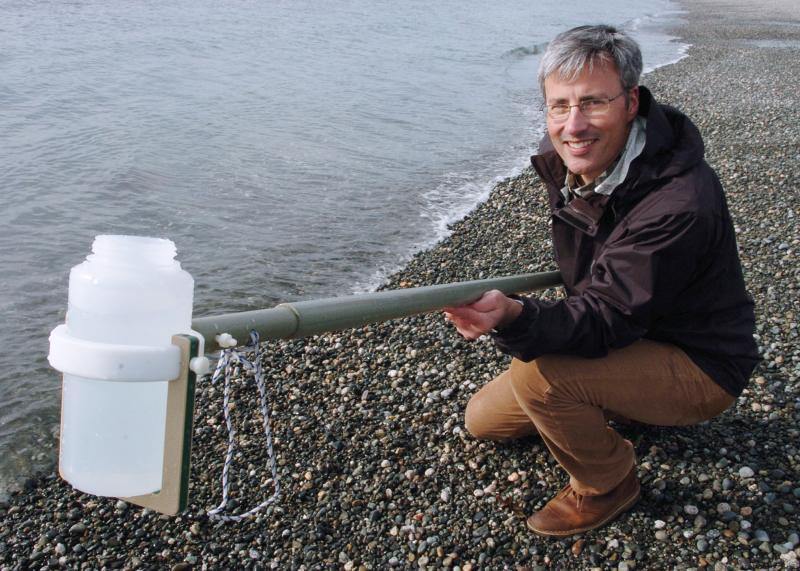New radioactivity monitoring network seeks volunteers
- Valerie Shore

Ever since the 2011 tsunami and nuclear disaster in Japan, there’s been widespread concern along the coast of western North America about the potential danger of low-level radioactivity from that event crossing the Pacific Ocean.
What are the levels of radioactive elements in our coastal waters? Do they pose a health risk to us? How will they affect marine ecosystems and the food chain?
You and other coastal residents can help scientists find some answers.
University of Victoria chemical oceanographer Jay Cullen has formed a new marine radioactivity monitoring network that draws on the expertise of scientists in Canada and the US, health experts, NGOs—and “citizen scientists” along the BC coast.
“There’s great public demand for information about the impact of the disaster on the marine ecosystem and on the health of British Columbians,” says Cullen. “Our goal is to provide the public with the best information possible about risks to the environment and their health.”
The InFORM network—which stands for Integrated Fukushima Ocean Radionuclide Monitoring—is now seeking volunteer citizen scientists to collect water samples and share science-based information on ocean health within their communities.
Ocean circulation models disagree on the timing and concentrations of radioactive elements expected off BC. We do know that the radioactive plume of seawater arrived on the coast in June 2013, and that levels detected so far don’t pose a health risk.
“In the next few years, as the highest concentrations from this plume arrive, we need to know what the concentrations are and what kind of risks they pose,” says Cullen. “And we won’t know that unless we monitor the situation properly.”
Research partners in the network include Woods Hole Oceanographic Institution in Massachusetts, Health Canada, the University of Ottawa, the University of British Columbia and Fisheries and Oceans Canada (DFO).
Also involved are NGOs such as the Clayoquot Biosphere Trust, the Georgia Strait Alliance, the Raincoast Education Society and the Living Oceans Society, which will help with public outreach, information transfer, and recruitment and training of citizen scientists.
“Citizen scientists are critical to the success of this network,” says Cullen. “By engaging directly with communities, we’re inviting those with a stake and an interest in marine environmental risk assessment to get involved.”
Citizen scientists are being sought in 14 coastal areas: Port Renfrew, Bamfield, Tofino/Ucluelet, Nootka Island/Tahsis, Winter Harbour, Port Hardy, Bella Bella, Hartley Bay, Prince Rupert, Haida Gwaii, Salt Spring Island, Powell River/Sunshine Coast, Vancouver and Victoria.
The network is aiming for a sampling team of 10 to 15 volunteers per area. They’ll be trained to collect 24-litre samples of seawater for radioisotope analysis and record important information such as water temperature and salinity. The levels of radioactivity present in water samples will not pose a health risk to volunteers, stresses Cullen.
Water samples will be collected monthly for three years and sent to labs for analysis. “Ideally, the samples would be taken near the coast rather than up inlets,” he says. “And it’s best if the Haida Gwaii samples are obtained on the west side of the islands.”
The samples gathered by community volunteers will supplement measurements already being taken offshore by DFO and an existing citizen scientist network coordinated by Woods Hole that extends from the Bering Strait to San Diego.
The data collected by the InFORM network will be disseminated online and through community meetings up and down the coast.
Prospective volunteers are asked to contact Cullen before Sept. 30 via a contact form at www.fukushimainform.ca. Once a database of interested citizens has been compiled, the network’s NGO partners will go to the communities to organize the groups.
InFORM is funded by $630,000 over three years by the Marine Environmental Observation Prediction and Response Network (MEOPAR).
MEOPAR is a team of Canadian researchers in the natural and social sciences trying to better understand and predict the impact of marine hazards on human activities and ecosystems. It’s hosted by Dalhousie University in Nova Scotia and funded by the federal Networks of Centres of Excellence Program.

